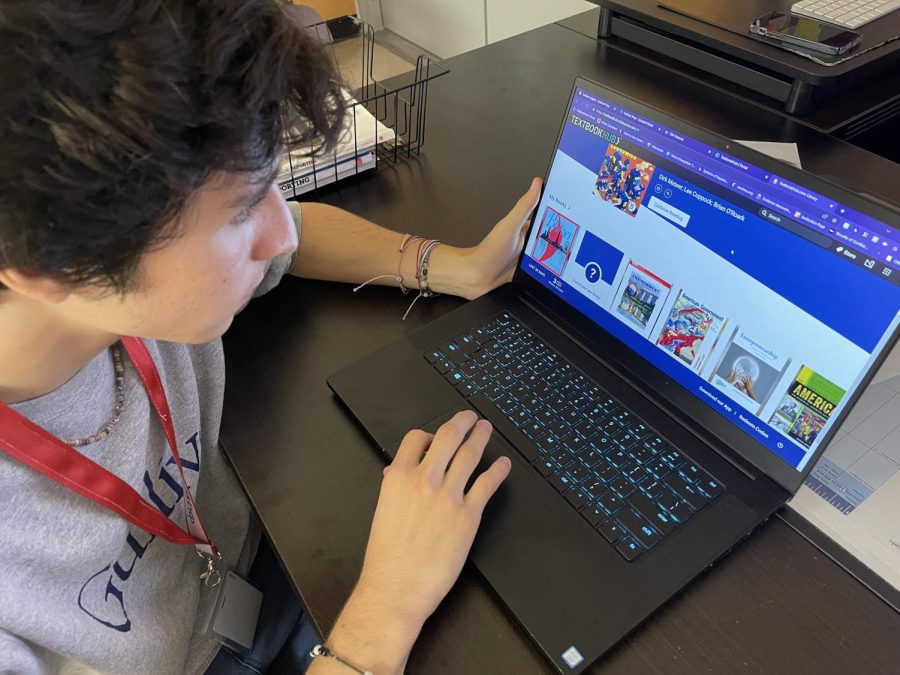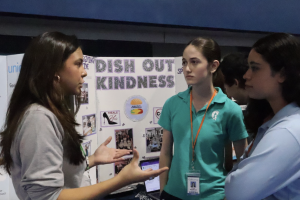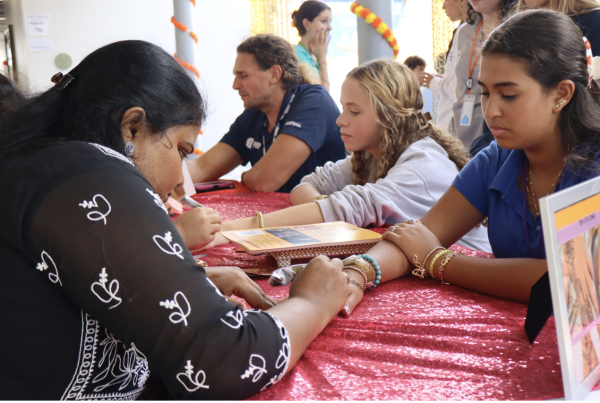Campus Voices | Can Digital Textbooks Replace the Original?
Senior Paulino Mercenari prepares to study for his AP Environmental Science class as he loads up the necessary textbook on TextBook Hub. For Paulino having digital books is much easier to manage. “The more use I can get out of my laptop, the better.”
September 15, 2022
Propelled by COVID-19, the transition from print to digital textbooks has been one recently favored by many school districts. This sudden change leaves many students divided over their preferred method of learning. Two students reached out to provide their outlooks on the issue and offer varying perspectives on the matter through Campus Voices: our opinion section by students outside the staff.
Digital Notebooks Help Less Paper Getting Wasted
Charlotte Nedee 26′
Due to most textbooks being online this year, a tremendous amount of paper is spared from being used and even wasted. A study on textbook recycling showed that 320 million textbooks are wasted every year. This is due to students throwing away their textbooks after each school year! Many studies have been done on this topic to prove that e-books are better for the environment than physical textbooks. 2011 marks the debut of-books, and since that year nearly five million sheets of paper have been saved. Not only does it help save paper, it helps lessen greenhouse gasses emitted into the atmosphere. The printing of books results in the emission of nearly four times more greenhouse gasses than e-books.
Although online resources help the environment, many people say that the manufacturing of these devices and the waste therefore produced creates more greenhouse gasses than paper production: this claim is not true. According to Breton Twoler who wrote an article about e-readers vs books, the production of a single paper book wastes about 7.5kg of carbon dioxide. Due to e-books, a total of a hundred times fewer greenhouse gasses are being released into the atmosphere. Not only do physical books produce more carbon dioxide, they also contribute to deforestation. Up to 14% of deforestation is done every year in order to meet the desired needs of paper. Opinions are varied on whether paper is better than technology, whether textbooks are better than online textbooks, but in my opinion using online textbooks is better for us and for the environment. Global warming is one of the biggest issues people have to live with today and having online textbooks is one of the small solutions towards aiding this problem.
Is the Computer to Blame?
Alice Kling 26′
Recently, many more resources provided by the school have been online, including our textbooks and library databases. This may seem helpful but there are some negative health impacts. The effects of too much screen time include sleep issues, neck and back pain, and anxiety: all factors resulting in poorer performance at school. Additionally, many people suffer from eye issues due to too much time spent on electronic devices. These issues can include headaches, blurred vision, dryness, eyestrain, and light sensitivity.
We already spend much time in school staring at our laptops— whether taking notes, researching, studying or watching lectures— and now we have our textbooks online too. Our computers have become a necessity. Using an online textbook all day then getting told to do it for homework is far too much time spent staring at a screen. It is better for our brain to read and write on paper. Not only will the lack of blue light come with less side effects but also will make it easier to understand and study. Print is visually less demanding than digital text. People even associate the computer to casual web surfing and they may rush through without fully absorbing the text.
Reading and doing work online is all a blur to me and the words have no meaning. The scrolling up and down also affects the flow of the reading. People who constantly have strained exposure to digital screens can suffer from computer vision syndrome (CVS).
In the end, reading a textbook online is just not worth the hassle and pain when we could simply have textbooks as either a class set or printed out pages to work on. There are many alternatives that don’t include the exhausted computer. Turns out paper might be the smartest choice to have a successful school year.
















